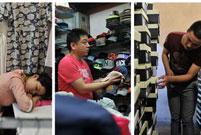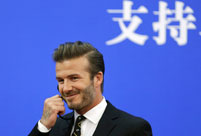 First Russian Street in Tianjin open to public
First Russian Street in Tianjin open to public
 Motorcycle stunt on the Bund
Motorcycle stunt on the Bund
 French Spiderman Alain Robert climbs up Galaxy Hotel in Macao
French Spiderman Alain Robert climbs up Galaxy Hotel in Macao
 Africans in Guangzhou
Africans in Guangzhou
 Pole dancer shows strength and beauty up in the air
Pole dancer shows strength and beauty up in the air
 College girls call for protection of ecological space on earth
College girls call for protection of ecological space on earth
 Top 10 celebrities driving auto brands
Top 10 celebrities driving auto brands
 10 low-carbon tips to save money
10 low-carbon tips to save money
 Luxury cars make Asia premiere at Auto China
Luxury cars make Asia premiere at Auto China
 Versatile dog
Versatile dog
 |
| Members of the China Entrepreneur Club after taking part in a seminar in the French Senate during their visit last year. (China Daily) |
Car magnate Li Shufu talks with friends as he comes to a tough decision
When it was announced four years ago that the Chinese carmaker Geely was buying Swedish carmaker Volvo, the company drew plaudits worldwide for the daring and astuteness of its move.
But few people are aware of the months of preparation that went into planning the $1.8 billion (1.3 billion euros) deal and the role that about 20 of China's richest and most powerful business people played in making it happen.
The man steering the ambitious plan was Li Shufu, Geely's chairman and founder. He had set up the company in 1986 as a refrigerator parts maker and had gone on to turn it into a maker of motorcycles, vans and inexpensive cars.
But as the time came to decide whether to shift up another gear by buying Volvo from Ford Motor Co of Detroit, Li's enthusiasm began to give way to doubts about whether the purchase would be in the company's best interests.
"Li was wavering before the deal was signed," says Cheng Hong, secretary-general of the China Entrepreneur Club, whose 46 members are some of China's wealthiest people.
"He asked us to arrange a meeting at which we could get together to discuss whether it was feasible."
In late November 2009, four months before the deal would eventually be announced, about 20 members of the club converged from all around China in the port of Ningbo, one of the country's oldest cities, and where one of Geely's production plants is located.
That night for over two hours in a conference room of the Marriott Hotel in the city center, the businesspeople debated the pros and cons of the deal.
Information about such deals is usually kept within a very tight circle of people, but such was Li's confidence in his fellow members that he put all his cards on the table, Cheng says. This included telling them of the dealings he had had with Ford, research from consulting companies and the potential attitudes of various governments to such a deal.
After Li had outlined what was at stake, there were warnings that he should be very careful before proceeding. After all, Geely had its hands burned earlier when it was forced to shelve an attempt to market a car in the United States, and Li was contemplating buying a highly respected but ailing 82-year-old brand.
After serious questions began to be raised about the wisdom of going ahead with the deal, Li addressed the gathering, Cheng says. She quotes him as saying:
"All my life my dream has been to have Chinese cars on the world's roads. That's what matters most to me. If I get bogged down in research and trying to build a brand from scratch, my dream may never come true. I have the chance to buy this thing, and that's what I'm going to do."
As Li's fellow entrepreneurs realized how strongly he felt, the mood in the room changed, Cheng says, and they then started talking about how he could make the deal succeed.
They tossed around ideas about legal matters, management, branding and marketing, finding and retaining talent and labor issues.
One CEC member, Guo Guangchang, founder and chairman of the industrial conglomerate Fosun High Technology Group, shared his overseas M&A experience, Cheng says.
Another, Liu Chuanzhi, founder and honorary chairman of China's largest PC maker, Lenovo Group Ltd, recounted how he had bought IBM's personal computer business.
"It was very moving," Cheng says. "Everyone spoke and held back nothing. Li was aware of the risks and was willing to face them. The others understood what he wanted to do and gave him their wholehearted support."
That meeting, pivotal to how Li proceeded, is just one of 25 member visits that CEC has organized since it was founded seven years ago. Each meeting is hosted in a member company's location, who are founders of leading companies in their industry. Through proactive discussions, participants learn from each other and solve their crucial problems.
The combined annual revenue of CEC member companies represents much more than 2 trillion yuan ($326 billion), accounting for about 4 percent of China's GDP last year and larger than the GDP of about 150 countries, including Denmark and Malaysia.
In addition to the entrepreneurs, there are eight academics and economists who act as advisers.
Yet it was figures of a far bleaker kind that brought the entrepreneurs together. In 2003, the SARS outbreak sparked a global health alert, and at least 800 people in 15 countries died after contracting the virus.

 Overseas returnees strive for dreams in Beijing
Overseas returnees strive for dreams in Beijing Fried up: Chili pork bonanza in Central China
Fried up: Chili pork bonanza in Central China Hand-painted maps go viral online
Hand-painted maps go viral online 4th Beijing Int'l Film Festival ends
4th Beijing Int'l Film Festival ends Commando elite specializes in sign language
Commando elite specializes in sign language Man photoshops himself into girlfriend's childhood photos
Man photoshops himself into girlfriend's childhood photos Photo story: Stallholders at Beijing Zoo Wholesale Market
Photo story: Stallholders at Beijing Zoo Wholesale Market Artists on backstage
Artists on backstage Beckham launches fund to support youth soccer in China
Beckham launches fund to support youth soccer in China 'African Street' in Guangzhou
'African Street' in Guangzhou Special operation members in comprehensive training
Special operation members in comprehensive training Cute Shaolin boy melts the hearts of millions
Cute Shaolin boy melts the hearts of millions Giant panda Sijia is back to happy life
Giant panda Sijia is back to happy life Richest Chinese of 2014: half from the mainland
Richest Chinese of 2014: half from the mainland Chengdu - laid-back lifestyle makes happiest city
Chengdu - laid-back lifestyle makes happiest cityDay|Week|Month